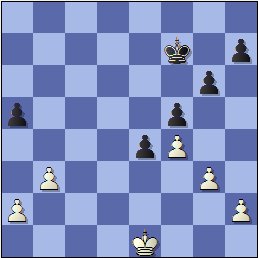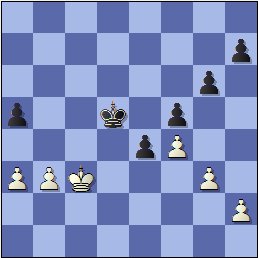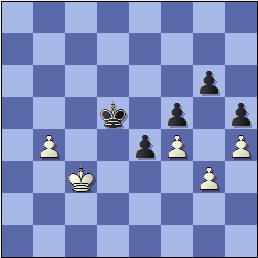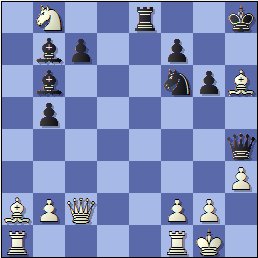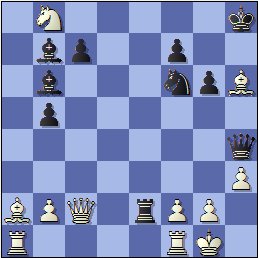And then there were eight.
The bloodbath continued today, with only three draws in the 20 games played, for a total of eight draws in 36 games for the round overall. (Soon the little-known GMs Vonahzdmisak and Vopihs will propose some radical measures to lower the excessive quantity of decisive games. Since a properly-played chess game should almost certainly be drawn, the high level of wins suggests a certain lack of competence in top-level play. Accordingly, if a game is won - especially if it is won too quickly - one suggestion is that the players replay their game with colors reversed with the previous time limit doubled. But I digress...) The games have been very exciting, if not always perfectly played.
Let's start with the bare facts and the pairings for the next round, and then we'll summarize the matches.
Polgar 4.5 - Dominguez 3.5 (that's the total score; the tiebreak score was 3.5-2.5 in her favor)
Ivanchuk 3 - Bu Xiangzhi 1 (2-0)
Ponomariov 4.5 - Bruzon 3.5 (3.5-2.5)
Gashimov 4 - Nielsen 2 (3-1)
Grischuk 2.5 - Potkin 1.5 (1.5-.5)
Quarterfinal Pairings (higher-rated player listed first, pairings given in bracket order):
- Svidler - Polgar
- Ponomariov - Gashimov
- Ivanchuk - Radjabov
- Grischuk - Navara
Now for the summary. Starting with the easiest, or at least most lopsided tiebreaker, Bu Xiangzhi went down without a fight to Vassily Ivanchuk. In the first game Bu had White in a Reti, but played it very passively and was already worse after 11 moves. He tried sacrificing first one pawn and then two, hoping that his bishops would give him some compensation, but they didn't and "Chuky" won easily. In the second game Bu tried the Czech Benoni, which is a reasonable way to at least avoid letting White kill the play from the start. Again Bu tried sacrificing a pawn for some play (Benko Gambit-style here, but with less effect thanks to the Black pawn on e5), but wound up just down a pawn for nothing. He tried following with further sacrifices, but Ivanchuk collected all the gifts and won with ease.
Grischuk-Potkin also finished in two games, but it wasn't anywhere near as easy. In the first game Grischuk didn't get anything with White from the opening. The game continued for a long time, with Grischuk generally having a very slight initiative, but it never became anything serious. In Potkin's white game, he repeated the aggressive anti-KID line that proved so effective in the first game of their match; naturally, Grischuk was better prepared this time. Instead of the (probably) dubious 7...Qe8 he went for the main line with 7...c6, which has scored very well in the past. The usual rejoinder is 8.Nf3, but Potkin went for 8.Qd2 instead. If it was an attempt at surprise, it boomeranged when Grischuk uncorked 8...d5, a new pawn sacrifice that looks completely sound. At a certain point Grischuk handled the position too slowly (e.g. 19...b5 probably improves on 19...a5), and Potkin started to consolidate the extra pawn. On move 22, it was probably best to swap rooks: 22.Rxe8+ Rxe8 23.Re1, when Black must either cede the file or draw closer to a two-results-only endgame. Instead, 22.b3?! b5! 23.cxb5?! Ne4! let Grischuk's pieces start jumping all over the place, and he soon regained his material and obtained the advantage. Eventually, Potkin rejected a bad rook ending for a completely lost pawn ending (exhaustion? time trouble?), and his great run came to an end.
Gashimov-Nielsen saw four decisive games in a row. Gashimov won the first rapid game with a slow Ruy, gradually building up a kingside attack that broke through. Nielsen won the rematch after a long, hard struggle. The key moments came on moves 34 and 42. Gashimov should have played 34...Rd8, not fearing 35.Nb5(?) as after 35...axb5 36.axb5 the king evacuates to safety starting with 36...Kd7. Instead, Gashimov's 34...Bxc3 was strongly met by 35.Qxd6! On move 42, Black could have kept some hopes alive with 42...Rh3: 43.Kg2 Rh2+ 44.Kxh2 Qxf2+ 45.Kh3 Qxf5+ 46.g4 Qh7+ 47.Kg2 Qe4+ 48.Kh2 and now either 48...Qe3 or 48...b6 keeps Black afloat. After Gashimov's 42...Nxf5, White obtained a winning endgame after 43.Qf4 Qxg3+ 44.Qxg3 Nxg3 45.Kg2 Ne4 46.Rxf7 and went on to equalize the match.
It was on to the 10-minute games (+10 second increments), and Gashimov again played a slow Ruy but eventually outplayed Nielsen to win again, and in the second game Gashimov went for the solid Schlechter Slav/Gruenfeld rather than repeating the Modern Benoni. It paid off, as he obtained an advantage out of the opening, and then the game and match were decided when Nielsen played 18.Be2??, an outright blunder costing him a piece. He kicked around a while longer - why not? - but there was nothing to be done, and he lost.
On now to Cuba vs. Europe, parts 1 and 2.
Starting with Ponomariov-Bruzon, Ponomariov won the first game by outplaying Bruzon from nothing on the white side of a Reti. The game was a nice illustration of how a knight can come to dominate a bishop even when that bishop isn't classically "bad". Bruzon struck back in game two with his own sideline opening, the Trompowsky. He didn't get anything from the opening either - or from the middlegame either, for that matter - but when Ponomariov blundered under pressure in the endgame, the match was tied. 42...Rd8 (preventing White's king from reaching d6) or 42...Rc8 (allowing the king to be driven back with ...Rc6+ after 43.Kd6 Ke8) would have held the balance. Instead, after the obvious but flawed 42...Ke7?/?? 43.Rf1 Rf8 44.Rxf8! Kxf8 45.Kd6 Black realized to his horror that the game cannot be saved. Even though Black could afford to lose everything if he can only eliminate the White e- and g-pawns (due to the bishop + wrong-colored rook pawn [or rook-pawn and wrong-colored bishop, if you prefer] problem), it couldn't be done.
With the psychological momentum, Bruzon won the first 10-minute game with Black, just overwhelming his opponent. Match over? Of course not! After an unusual and strategically complicated opening, Ponomariov managed to bring the position to an ending with two bishops vs. a bishop and knight, with both players having a-, g- and h-pawns. Objectively, it's probably a draw, but to hold it in what's essentially a blitz game against a great technician is nearly impossible. It took Ponomariov 47 moves from the start of that ending to win it, but win it he did.
On to blitz. Ponomariov drew the first game with Black without any adventures, and the match was finally decided in the next game. Ponomariov headed for a line where Black can win a piece for two pawns and a lot of risk, and Bruzon went for it. 17...Qd7 was natural but seems to be a mistake. Ponomariov was able to reach an ending with four connected passed pawns on the kingside as "compensation" for the piece, and while it took a while the fearsome foursome decided the issue: game and match, Ponomariov.
Finally, Polgar-Dominguez. Polgar won the first game very easily, gobbling up one pawn after another in a Grand Prix Attack sideline. A very convincing win, but then Polgar went against her style, choosing the rather bland, passive Scandinavian in an attempt to be solid. Dominguez won very easily, and the only drama was trying to figure out why Polgar continued as long as she did. (Maybe she felt Dominguez should have resigned the first game sooner than he did, and wanted "revenge"?)
Polgar won the first 10-minute game with a bit of luck; the kind of luck you get when you put a lot of pressure on your opponent. She burned too many bridges on the white side of a 6.Bc4 Najdorf, and while Dominguez had to be very careful, a few accurate moves would give him the win. Instead, successive errors on moves 27 and 28 took the position from won to equal to completely lost. (In case you're wondering, 27...Kg8 was winning and 28...Rg1+ 29.Kxg1 Bxh4 30.Qxh4 Rg8+ followed by 31...Rg6 holds the balance. In the rematch, Polgar again played the Scandinavian and again got a passive position out of keeping with her style. Dominguez won easily.
In the first five-minute game, Polgar replayed the line that was so successful in game one, but Dominguez played much better this time. Polgar might have had a slight edge early on, but Dominguez outplayed her and obtained a serious advantage. At least twice the advantage could have been decisive (30...Nc5, 41...Rd1+ followed by 42...Rc1), but after 41...Nxa5? White was better. In fact, with 45.Rh8+ and only next 46.e7 Polgar would have been winning, but both players were in serious time trouble at this point. The game was soon drawn, and both players seemed relieved to have survived.
Finally, Polgar returned to the Sicilian in the last game and reached a position similar to what would arise via her beloved Paulsen/Taimanov. Dominguez played by far his worst white game of the match, and after the oversight 19.h5?? was crushed after 19...Nxf3. His 20.Qg3 was even worse, but he probably felt that he'd have no chance in the endgame after the "correct" 20.Bxc7 Nxe1 21.Rxe1 Rxc7. Anyway, he had no chance after 20.Qg3 either, and Polgar finished with an iron hand.
Official site (with video coverage) here.
 Thursday, September 8, 2011 at 8:40PM
Thursday, September 8, 2011 at 8:40PM 